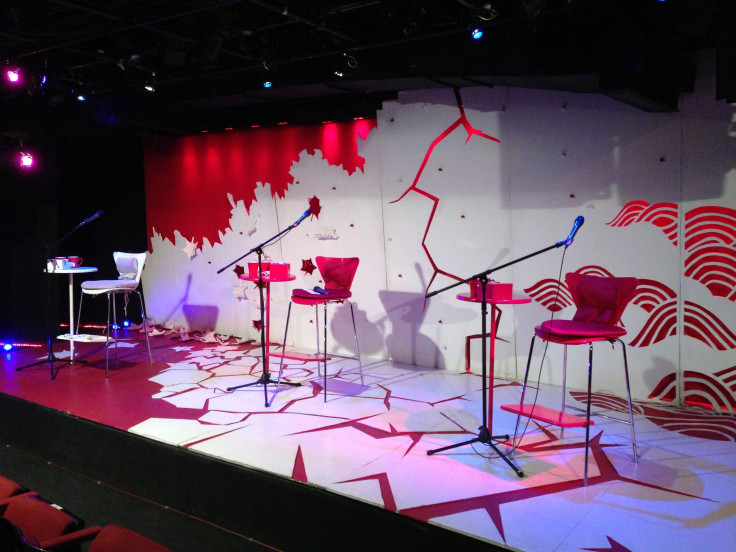
Eve Ensler's innovative play "The Vagina Monologues" is returning to its original off-Broadway home with an all-new all-Spanish language version. "The Vagina Monologues" will begin on May 6th at the Westside Theater (407 West 43rd Street). Mexican director Jaime Matarredona will be at the head of the production, with Morris Gilbert and Federico González Compeán as producers. This will be the first time the Spanish-language version will be presented in an off-Broadway theater. Latin Times spoke with Jaime about his production. The actresses to lead the cast are Mexican actresses Angélica Vale, Angélica María, Kate Del Castillo and Puerto Rican star Miriam Colón.
LT: Can you talk about your career and how you came to direct ‘The Vagina Monologues’?
I started as an actor, as almost everyone does. And little by little I started working as an assistant director and liking it a lot. So little by little I started finding ways to direct plays. Actually ‘The Vagina Monologues’ was one of the first shows that I had the opportunity to direct. That was nearly fourteen years ago – going back to 2000. And the show has been running ever since. Since then I have directed several shows. I’ve had the luck of directing just about everything. I’ve directed intense dramas like ‘August Ausage County,’ ‘Doubt,’ and ‘Proof.’ I’ve also had the chance to direct lighter works and comedies: I directed ‘Defending the Caveman’ and ‘Defending the Cavewoman.’ I’ve also directed ‘Steady Rain’ which was done on Broadway, I’ve also directed a couple of musicals – I directed Peter Pan. I also have a small company that does opera for children – we do short versions of classic operas and we intercut musical scenes but we leave it in its original language. That’s because I like opera a lot and I like the idea of bringing it to children.
LT: How much influence has this play had on you and on your career?
Well, the truth is that it has changed my life. On a professional level, it was a huge leap for me being able to have a success of this level in my career. To be able to meet several women who have an important place in the world of entertainment and in Mexican society because we have had so many actresses in Mexico and I have had the pleasure of directing most of them. Which is great because ‘The Vagina Monologues’ is a very personal work that doesn’t require a lot of directorial interpretation – rather it’s about it the person performing. So, naturally, during the rehearsal process, I get to know the people I work with to a certain depth. I’ve made some really great friends. It’s also a show that touches you in a very profound way and speaks to your human nature. And it does it through laughter, which can be a very powerful tool. Which has allowed me to tell stories in a playful way that still allows the message to come through.

LT: How important has this work been for theater and for feminism?
It’s certainly surprising that a piece of theater has played for 14 seasons uninterrupted. It might be one of the only shows to have done so. At a minimum it has vindicated the word ‘vagina,’ which had been relegated for many years as a bad word – I even remember typing it on a computer and having it underlined as a mistake. And now that doesn’t happen – at the end of the day it’s just another part of the anatomy like ‘ear’ or ‘nose’ or ‘belly-button.’ And I think that’s a big advancement – that people can actually say the word ‘vagina’, not just by saying it but for what it implies: it means we can talk about things openly without having to resort to euphemisms. Because euphemisms always imply something sinister or wrong. I think it has been very empowering to women.
LT: How did the idea to bring this show to the U.S. first come about?
Well this has been something that the producers have been working on for many years. Broadway is really the mecca for theater for Latinos. Also the play’s author, Eve Ensler, is a heavily involved in the fight against violence towards women. She has an organization called ‘V-Day’ which raises funds and awareness to fight violence against women. And she really wanted to reach Latina women and men in New York, many of whom don’t speak English. This play has been presented in extremely patriarchal societies like Afghanistan and Iran and the fact that many women can’t experience the play in their native language was something that really troubled Eve. So things really came together – we wanted to make theater in the United States, she wanted to produce this text in the U.S. in Spanish, so it just worked.
LT: What will the relationship be between the Mexican production and the American production?
The productions are going to be quite similar. The production design is going to be the same: it’s a set design that’s been evolving and it’s something very modern, the colors are very strong in black and red. We have the four elements represented above the stage, and for us the element of air is really important because air is what allows us to talk. And this show is really about talking, about storytelling. Rehearsals are going to be mostly in New York.
LT: Are you excited about having a show you have directed in New York?
Yes, obviously. I mean, seeing your name written on a program in New York City is definitely exciting. As I said, New York really is the mecca for theater, so this is really a dream come true.
LT: How long will the season last?
At the moment we are thinking six months – I guess the public will decide whether it will be more or less than that. But we want to always have a cast that is interesting to our audience. We will be changing actresses regularly, which will allow us to have a number of different actresses. Thankfully, the show has a certain degree of flexibility that can allow us to interchange performers easily which is great.
LT: What are your plans after the show opens?
Well I think I will be in New York for at least a month. I have actually just premiered a show called ‘Sexy Laundry’ and actually the day of the opening I had to fly to New York to arrange some things for the show. So I love being able to link things and luckily I’ve always got something to work on, I’m very fortunate.
LT: Where did you find your inspiration for this show?
Well I mean the mean inspiration came from Eve who imagined the performers sitting on a small stool at a microphone. And that was very important for the sensuality of the mouth. And the women would be barefoot, which speaks to the freedom and confidence of the woman.
LT: How do you think this show will impact, or indeed has impacted, Latina women as opposed to American women?
What’s surprising, and one of the reasons we are doing this, is how long this show has been running for. I mean, we’ve had over 7,000 performances here in Mexico, the show had 1,381 performances in New York originally, which is about a third of what the Mexican show has had. I think this suggests that the show strikes a very deep chord with Latina women.
LT: How do you feel about the state of theater in Mexico right now?
I think Mexican theater is going through a difficult time at the moment. Living from the theater in Mexico is really not easy. It’s hard to know what plays will function at a commercial level. I think a lot of directors or theater makers aren’t worried about whether the theater will really speak to its audience, which I think is something very important. At the end of the day, theater is the most ephemeral art form. It’s not like a painting, or a piece of music or a film: every performance is different. So it is important for theater to keep evolving, and I think we need re-examine the way we make theater.
© 2025 Latin Times. All rights reserved. Do not reproduce without permission.




